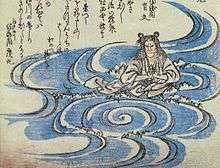Hashihime
Hashihime (橋姫) ("the maiden of the bridge"[1]) is a character that first appeared in Japanese Heian-period literature, represented as a woman who spends lonely nights waiting for her lover to visit, and later as a fierce “oni” or demon fueled by jealousy. She came to be associated most often with a bridge in Uji.

Biography
Very little is known about the origin of Hashihime. The most common interpretation is that she was a lonely wife pining for her husband / lover to return but due to his infidelity, she became jealous and turned into a demon.
Japanese literature
Hashihime first appears in a Kokinshu (ca. 905) poem, of which the author is unknown:
- “Upon a narrow grass mat
- laying down her robe only
- tonight, again –
- she must be waiting for me,
- Hashihime of Uji”
Hashihime’s name also appears in Murasaki’s The Tale of Genji, as the title of a chapter. She is also mentioned several times in the waka poems throughout the work.
References
- Shikibu, Murasaki; Tyler, Royall (2003). The tale of Genji. Penguin. p. 827. ISBN 978-0-14-243714-8. Retrieved 25 January 2012.
External links
- Hashihime - The Bridge Princess at hyakumonogatari.com (English).
- The Tale of the Hashihime of Uji at hyakumonogatari.com (English).